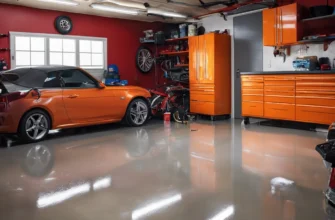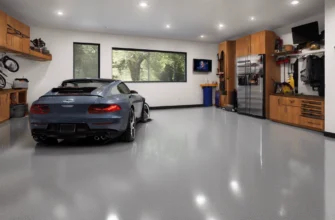- Introduction to Epoxy Flooring
- The Benefits of Choosing Epoxy for Garages
- Understanding the Durability of Epoxy Flooring
- How Epoxy Stands Up to Heavy Vehicle Traffic
- Epoxy’s Resistance to Common Garage Challenges
- Maintenance Tips for Long-lasting Epoxy Flooring
- Comparing Epoxy to Other Flooring Options
- Cost Effectiveness of Epoxy Flooring Over Time
- Conclusion: Investing in Long-lasting Durability
Introduction to Epoxy Flooring
Epoxy flooring refers to a surface coating made from a mixture of resin and hardener that, when combined, creates a durable and robust surface ideal for various applications, particularly in garage settings. The epoxy resin is a synthetic polymer that undergoes a chemical reaction to harden, forming a resilient surface that can withstand heavy wear and tear. This flooring solution is particularly attractive to homeowners looking to enhance their garages due to its exceptional durability, ease of maintenance, and aesthetic appeal.
One of the primary components of epoxy flooring is the epoxy resin itself, which provides a glossy finish and contributes to the longevity of the surface. The hardener, when mixed with the resin, initiates the curing process, allowing the epoxy to harden and bond effectively to the substrate. The application process typically involves preparing the concrete floor by cleaning and repairing it, applying a primer, and then adding multiple layers of the epoxy mixture. Finally, decorative chips or anti-slip additives may be incorporated to enhance the flooring’s functionality and appearance.
Epoxy flooring is particularly suitable for garage environments due to its resistance to stains, spills, and chemical damage, making it a practical choice for homeowners who often engage in automotive repairs or maintenance. Its ability to withstand heavy loads without cracking or peeling is essential for garages where tools, machinery, and vehicles are frequently stored. Furthermore, epoxy’s moisture and mold resistance add to its appeal, ensuring it maintains its integrity over time. Celebrities of the flooring landscape, epoxy surfaces can last for decades, making them a smart investment for both functionality and aesthetics.
The Benefits of Choosing Epoxy for Garages
Epoxy flooring presents numerous advantages, particularly for garages which often endure heavy foot and vehicle traffic. One of the most significant benefits of choosing epoxy flooring is its exceptional durability. Epoxy surfaces can withstand considerable impacts without cracking or chipping, which is essential for garages used not only for personal vehicles but also for commercial purposes. This durability translates into a long-lasting solution, reducing the need for frequent repairs and replacements, which can save both time and money in the long term.
An additional advantage of epoxy flooring is its high resistance to spills and stains, a critical factor for garages where oil, chemicals, and other substances are commonly present. Unlike traditional concrete, epoxy forms a non-porous surface that prevents liquids from penetrating, making clean-up simple and efficient. This property not only retains the aesthetic appeal of the garage but also contributes to a safer environment by minimizing slip hazards associated with spills.
The chemical resistance of epoxy flooring is yet another benefit that reinforces its suitability for garages. Many common materials, such as gasoline, brake fluid, and household chemicals, have the potential to damage standard flooring options. However, epoxy can withstand exposure to these substances without deterioration, ensuring the floor remains intact and visually appealing. This is particularly pertinent in settings where vehicles are regularly maintained and serviced.
Furthermore, epoxy floors are easy to maintain. Regular sweeping and occasional mopping are sufficient to keep the surface looking its best, alleviating the burdensome upkeep typically associated with other flooring types. The combination of durability, resistance to spills and stains, and low maintenance makes epoxy flooring a remarkable choice for any garage, whether it serves personal or commercial needs.
Understanding the Durability of Epoxy Flooring
Epoxy flooring is renowned for its remarkable durability, which has made it a popular choice for garage applications. The strength of epoxy flooring begins with its unique composition, comprising a thermosetting resin and hardener. When mixed, these components undergo a chemical reaction that results in a robust and resilient material. The molecular structure created during this process accounts for its enhanced adhesion, ensuring that it bonds effectively to various substrates, including concrete. This tight bond minimizes the risk of peeling or chipping, even under stressful conditions.
Moreover, epoxy flooring exhibits excellent resistance to a range of environmental factors. For instance, it can withstand exposure to chemicals, oil, and grease, making it particularly suitable for garages, where such substances are commonly found. The non-porous nature of epoxy further ensures that spills do not penetrate the surface, which facilitates easy cleaning and maintenance while preserving the integrity of the floor. The durability is not only about wear and tear; it also encompasses the ability to endure temperature fluctuations and heavy loads without compromising structural quality.
Another essential aspect of epoxy flooring’s durability is its ability to resist impact and abrasion. This is particularly beneficial for garages, where tools and equipment are frequently moved. The flooring can absorb shocks from dropped items, reducing the likelihood of surface damage. Additionally, the UV stability of high-quality epoxy products ensures that the flooring maintains its color and gloss over time, even in the presence of sunlight. Consequently, owners can expect their epoxy flooring to remain intact and visually appealing for decades.
How Epoxy Stands Up to Heavy Vehicle Traffic
When it comes to flooring solutions for garages, durability is paramount, especially in environments that accommodate heavy vehicle traffic. Epoxy flooring is renowned for its remarkable ability to withstand the weight and movement of cars, trucks, and even heavy machinery. Its strength derives from its unique formulation, consisting of a resin and hardener that chemically bond to create a robust, impact-resistant surface.
Many garage owners have discovered the advantages of epoxy flooring firsthand. For instance, one owner reported that their epoxy-coated garage remained unblemished despite the continuous parking of a 10,000-pound truck. They noted that previous flooring options, such as concrete tiles, often cracked and chipped under similar conditions, prompting a costly investment in repairs. Epoxy’s resistance to heavy loads ensures that it retains its integrity and aesthetics over time, which is a significant consideration for anyone looking to maintain a functional garage.
Additionally, epoxy flooring provides a slip-resistant surface, paramount for safety in environments where heavy vehicles are in operation. Garage owners have praised the feel and grip of epoxy, especially after spills or during rainy conditions, as it minimizes the risk of accidents. Unlike traditional flooring materials, which may deteriorate quickly under consistent wear from heavy traffic, epoxy floors typically last decades, proving to be a sound investment for homeowners.
Moreover, the seamless nature of epoxy flooring simplifies cleaning and maintenance, allowing garage owners to keep their surfaces looking new despite the daily strains from vehicles. This not only enhances durability but also contributes to the overall aesthetic of the garage space, increasing its desirability. With actionable benefits supported by positive testimonials, it is evident that epoxy flooring stands as a superior choice for those needing a resilient solution to heavy vehicle traffic.
Epoxy’s Resistance to Common Garage Challenges
Garages serve multiple purposes, from vehicle storage to being used as workspaces, and they often encounter various challenges that can compromise their flooring. Oil spills, chemical exposure, and physical damage such as chips and scratches are common issues faced in these spaces. Fortunately, epoxy flooring is specifically designed to withstand these challenges, making it an ideal choice for garage environments.
One of the prominent benefits of epoxy flooring is its exceptional resistance to oil spills. With vehicles constantly coming in and out, accidental oil leaks are unavoidable. However, epoxy’s non-porous surface prevents oil from seeping in, allowing for easy cleanup without any residue left behind. This means that any spills can be simply wiped away, minimizing potential damage and maintaining a clean appearance.
In addition to oil, garages often store various chemicals such as paints, solvents, and cleaning agents. Epoxy flooring has a remarkable resistance to harsh chemicals, meaning it will not degrade or discolor in response to exposure. This feature is crucial for homeowners who frequently use their garage as a workshop or storage area for substances that could otherwise damage traditional flooring options.
Physical wear and tear can also take a toll on garage floors. Heavy tools, equipment, and vehicles can lead to chips and scratches over time. Epoxy flooring is known for its high durability and hardness, making it resistant to such damage. Consequently, garages equipped with epoxy flooring not only retain their aesthetics but also their functional integrity, standing up to the daily rigors of garage use.
Overall, the combination of oil spill resistance, chemical resilience, and physical durability makes epoxy flooring an excellent solution for tackling common garage challenges effectively. Be it aesthetics or functionality, epoxy stands the test of time, providing a reliable surface that can last for decades.
Maintenance Tips for Long-lasting Epoxy Flooring
Epoxy flooring is renowned for its durability and attractive finish, making it a preferred choice for garages. To ensure that this flooring retains its aesthetic appeal and functionality over the long term, regular maintenance is essential. Below are several practical tips to maintain epoxy floors effectively.
Firstly, establishing a routine cleaning schedule is important for preventing dirt and debris accumulation. Sweeping or vacuuming your garage floor regularly can mitigate the buildup of grit that may scratch the surface. A damp mop with a mild detergent solution can be used periodically to remove stains and keep the floor looking pristine. It’s crucial to avoid harsh chemicals, as these can degrade the epoxy finish over time.
Additionally, employing preventative measures can significantly extend the life of your epoxy flooring. Utilizing mats at entry points can catch dirt and moisture, preventing them from being tracked onto the surface. The use of floor protectors on heavy furniture and equipment can also minimize scratching and denting, preserving the integrity of the floor.
If any wear or damage occurs, timely repairs are fundamental. Minor scratches or scuffs can often be managed using an epoxy repair kit, which blends seamlessly with the existing flooring. For larger issues, consulting a professional for repair might be advisable. This proactive approach not only helps to maintain the appearance of the flooring but also ensures that more extensive repairs do not become necessary down the line.
By implementing these maintenance tips—consistent cleaning, preventative strategies, and prompt repairs—you can significantly prolong the lifespan of your epoxy flooring. This diligent approach will keep your garage floor looking new and functioning optimally for many years to come.
Comparing Epoxy to Other Flooring Options
When considering garage flooring solutions, it is essential to evaluate various options, including concrete, tiles, vinyl, and epoxy coatings. While concrete is the most common flooring material for garages, it has its limitations. Unsealed concrete can be porous, which means it can absorb oil stains, moisture, and chemicals, leading to potential damage over time. Additionally, traditional concrete can crack under extreme temperatures or heavy impact, resulting in an uneven surface that requires extensive repair.
On the other hand, tiles, such as ceramic or porcelain, offer aesthetic appeal and a range of design choices. However, they are susceptible to cracking under heavy objects and may require grout maintenance, which can be challenging in a garage environment. Furthermore, tile installations typically demand a level substrate, adding extra time and cost to the project. While they can be a decorative choice, their durability in high-traffic areas like garages may not compare favorably to epoxy flooring.
Vinyl flooring, although versatile and easy to install, often lacks the robustness required for garage use. It can easily warp or tear under high stress, particularly when exposed to heavy vehicles or tools. Moreover, vinyl does not inherently resist chemicals commonly found in garages, such as oil and automotive fluids, which can compromise its long-term viability.
Epoxy flooring emerges as a superior choice due to its remarkable durability and resistance to damage from impacts, chemicals, and moisture. A properly installed epoxy coating creates a seamless surface that is easy to clean and maintain. Unlike other flooring options, epoxy can withstand the rigors of daily garage activity, including heavy wear-and-tear, making it an ideal investment for homeowners seeking longevity and performance. Overall, epoxy flooring provides an unparalleled combination of aesthetics and durability, positioning itself as an optimal choice for garage environments.
Cost Effectiveness of Epoxy Flooring Over Time
When considering flooring options for garages, epoxy flooring stands out due to its significant long-term cost benefits. Although the initial investment for installing epoxy flooring may seem higher compared to traditional flooring materials, its durability and longevity can lead to substantial savings over time. This flooring solution is known for its resilience, often lasting for decades without the need for replacement, which is a strong advantage for homeowners and businesses alike.
Epoxy flooring is highly resistant to various forms of wear and tear, including stains, spills, and heavy impacts. This feature minimizes the need for frequent repairs that are typical with other types of flooring systems. For instance, conventional concrete or vinyl flooring can chip or crack over time, leading to costly repairs or premature replacements. In contrast, an epoxy surface remains intact, preserving both the aesthetic and functional qualities of the garage for years, further enhancing its cost-effectiveness.
Moreover, the maintenance associated with epoxy flooring is relatively low. Routine upkeep typically involves simple cleaning practices, thereby reducing labor and material costs associated with repairs and maintenance. This is particularly advantageous for busy garage environments that often endure heavy usage. Furthermore, the non-porous nature of epoxy helps in preventing mold and mildew growth, thereby safeguarding the investment against unforeseen expenses.
In essence, while the upfront costs of installing epoxy flooring may be greater, the durability and reduced maintenance needs translate to long-term financial benefits. This flooring choice not only prevents the repetitive costs associated with repairing or replacing inferior flooring options but also adds value to the property. Therefore, investing in epoxy flooring is not just a matter of immediate needs but also a strategic move for the future.
Conclusion: Investing in Long-lasting Durability
Opting for epoxy flooring in garages presents a unique opportunity for homeowners and business proprietors looking to enhance their spaces with durability and aesthetic appeal. Throughout this discussion, the multifaceted benefits of epoxy flooring have been highlighted, underscoring its suitability for harsh environments typical in garages. This flooring solution not only withstands heavy impact and abrasion but also combats various chemicals that might otherwise degrade conventional flooring materials.
While the initial financial outlay for epoxy flooring may seem considerable compared to traditional flooring options, it is important to consider the long-term savings it affords. Epoxy flooring is both resistant to stains and easy to clean, significantly reducing maintenance costs over time. Additionally, the longevity of quality epoxy installations typically spans decades, far exceeding that of alternative surfaces, which often require costly repairs or replacements. This aspect alone makes epoxy a wise investment.
Moreover, the aesthetic versatility of epoxy flooring allows for the customization of colors and finishes, enhancing not only the appearance of your garage but potentially increasing the property’s value. This aesthetic appeal, in conjunction with practical benefits such as ease of installation and maintenance, solidifies epoxy flooring as a superior choice.
Ultimately, the decision to install epoxy flooring should be viewed through the lens of long-term investment. When considering factors such as durability, maintenance savings, and enhanced property value, the initial cost becomes a secondary consideration. Choosing epoxy flooring is not only about immediate needs but also about securing a resilient, functional, and visually appealing space that will serve effectively for years to come.








